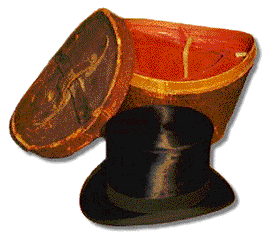Mercantilism was an economic policy, popular in the 17th and 18th centuries in Europe, which stated that a country's wealth and power was best served through
- the accumulation of gold and silver and raw materials.
| State action, an essential feature of the mercantile system, was used to accomplish its purposes - to sell more than it bought to accumulate gold bullion and raw materials. In the case of New France, fur was the raw material. France imported raw materials, such as furs, from its colony, New France, and transformed them into finished products (beaver hats) to be sold back to the colonies and to other countries. | 
Beaver Hat
|
- New France became a trading colony whose main economic role was to supply furs to the mother country and to purchase manufactured products from the mother country.
- Furs account for more than 70% of the colony's exports and the fur trade is directly responsible for the large expansion of territory.